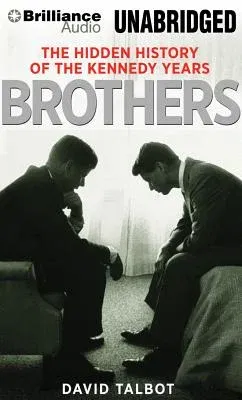For decades, books about John or Robert Kennedy have woven either a
shimmering tale of Camelot gallantry or a tawdry story of runaway
ambition and reckless personal behavior. But the real story of the
Kennedys in the 1960s has long been submerged -- until now. In Brothers:
The Hidden History of the Kennedy Years, David Talbot sheds a dramatic
new light on the tumultuous inner life of the Kennedy presidency and its
stunning aftermath. Talbot, the founder of Salon.com, has written a
gripping political history that is sure to be one of the most
talked-about books of the year. Brothers begins on the shattering
afternoon of November 22, 1963, as a grief-stricken Robert Kennedy
urgently demands answers about the assassination of his brother. Bobby's
suspicions immediately focus on the nest of CIA spies, gangsters, and
Cuban exiles that had long been plotting a violent regime change in
Cuba. The Kennedys had struggled to control this swamp of anti-Castro
intrigue based in southern Florida, but with little success. Brothers
then shifts back in time, revealing the shadowy conflicts that tore
apart the Kennedy administration, pitting the young president and his
even younger brother against their own national security apparatus. The
Kennedy brothers and a small circle of their most trusted advisors --
men like Theodore Sorensen, Robert McNamara, and Kenneth O'Donnell, who
were so close the Kennedys regarded them as family -- repeatedly
thwarted Washington's warrior caste. These hard-line generals and
spymasters were hell-bent on a showdown with the Communist foe -- in
Berlin, Laos, Vietnam, and especially Cuba. But the Kennedys continually
frustrated their militaristic ambitions, pushing instead for a peaceful
resolution to the Cold War. The tensions within the Kennedy
administration were heading for an explosive climax, when a burst of
gunfire in a sunny Dallas plaza terminated John F. Kennedy's presidency.
Based on interviews with more than one hundred fifty people -- including
many of the Kennedys' aging "band of brothers," whose testimony here
might be their final word on this epic political story -- as well as
newly released government documents, Brothers reveals the compelling,
untold story of the Kennedy years, including JFK's heroic efforts to
keep the country out of a cataclysmic war and Bobby Kennedy's secret
quest to solve his beloved brother's murder. Bobby's subterranean search
was a dangerous one and led, in part, to his own quest for power in
1968, in a passion-filled campaign that ended with his own murder. As
Talbot reveals here, RFK might have been the victim of the same plotters
he suspected of killing his brother. This is historical storytelling at
its riveting best -- meticulously researched and movingly told. Brothers
is a sprawling narrative about the clash of powerful men and the darker
side of the Cold War -- a tale of tragic grandeur that is certain to
change our understanding of the relentlessly fascinating Kennedy saga.

